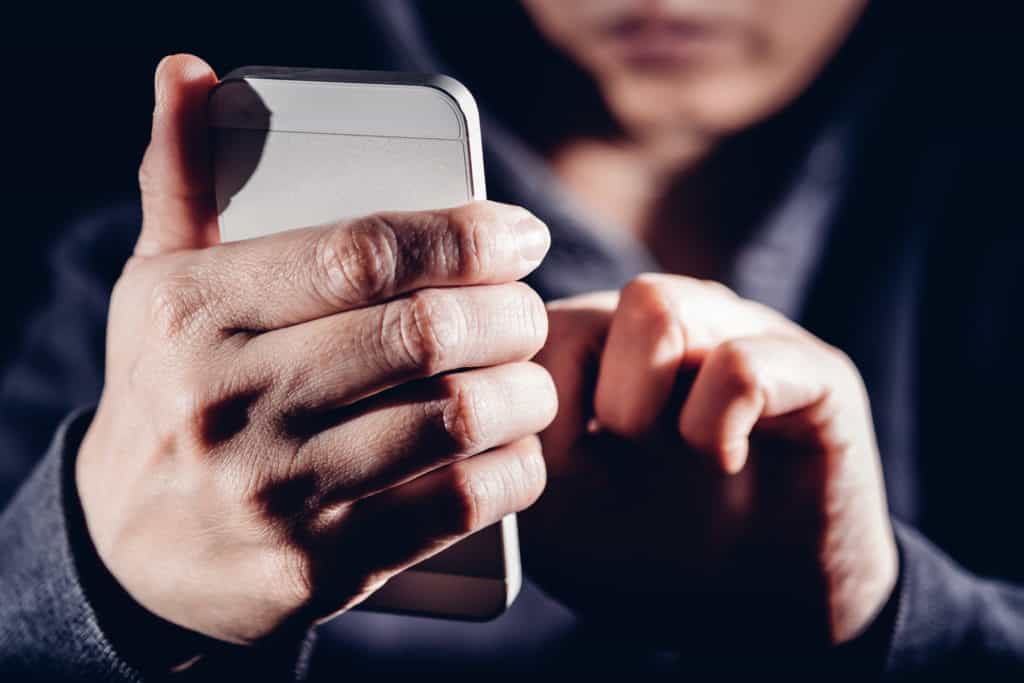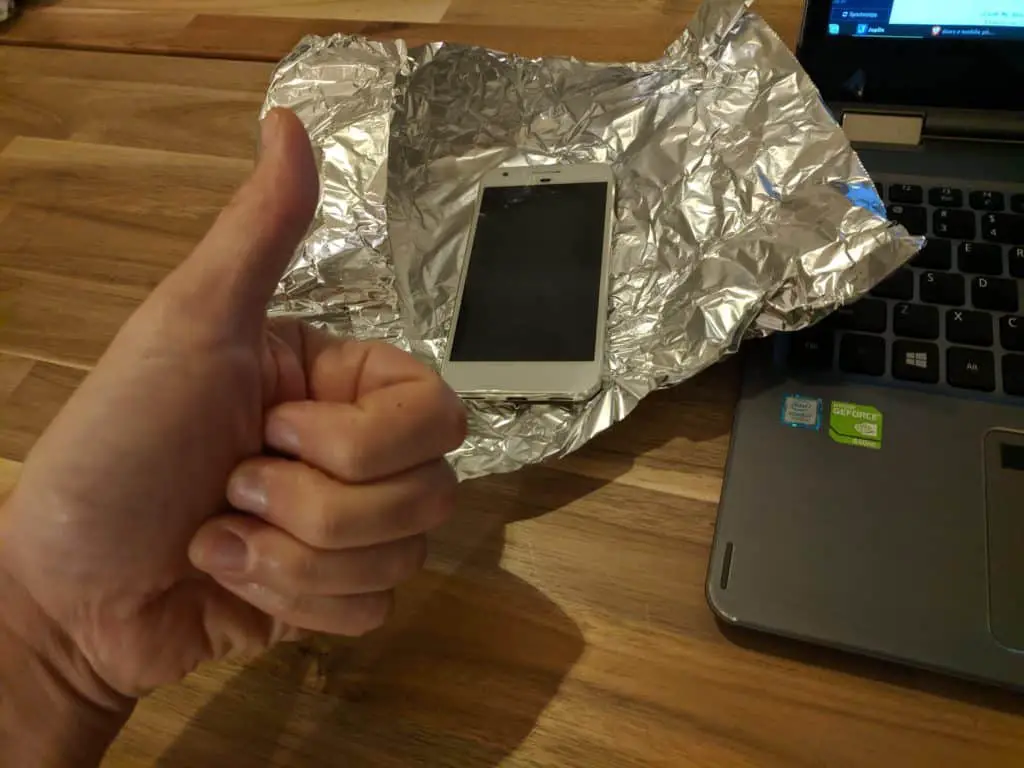Do you have the uneasy feeling that someone’s tracking your every move through your smartphone? You’re not alone. In today’s digitally connected world, owning a smartphone means dealing with an unexpected level of location surveillance. To put your mind at ease, let’s uncover how you can tell if someone is tracking your location.
Generally, signs of phone location tracking include faster battery draining due to GPS, Wi-Fi, and Bluetooth usage. Users may see frequent location icons in their notification bar or unexpected app location permission requests. Your mobile carrier may also track you via your cellular connection.
Here's how these signs point towards your location tracking…
How Do You Know If Someone is Tracking Your Phone?
There are some common signs to check if your phone is being tracked. Remember that these are hints of location tracking and not full indicators.
Red Flags Indicating Phone Tracking
To identify whether your smartphone is being tracked, look out for these red flags:
Excessive Battery Drain: Applications that track your location use GPS, Wi-Fi, and Bluetooth to obtain your position. These services consume more power, leading to a rapid battery drain.
Unknown Apps with Location Permissions: Apps you don’t recognize having location permissions are suspicious. These apps may be harvesting your location data without your knowledge.
Location Icon in the Status Bar: If you notice a location icon appearing frequently in your status bar, it indicates that an app is accessing your location.

Diagnostic Tools and Settings Checks
For iOS:
Settings > Privacy > Location Services: Here, you can see which apps have accessed your location recently, indicated by a purple arrow. You can also change the permissions for each app.
Settings > Battery: Check the battery usage details to find out if an app is using an unusually high amount of battery, which could indicate tracking.
For Android:
Settings > Location: This section provides an overview of apps that have accessed your location.
Settings > Battery > Battery Usage: Similar to iOS, here you can identify apps consuming excessive battery.
Reviewing App Permissions
The "why" behind reviewing app permissions is straightforward—each app that has location permissions can potentially track you. Therefore, it's crucial to ensure only trustworthy apps have this access.
iOS: Settings > Privacy > Location Services > [App Name]
Android: Settings > Apps > [App Name] > Permissions
Limit permissions to "While Using the App" or "Ask Every Time" to have better control over when your location is accessed.
Cellular Network Service Means You're Being Tracked
If your phone is connected to a cellular network, then it's likely you're being tracked to some extent—by the carrier itself, at the very least.
This tracking is essential for service delivery. Your phone needs to communicate with nearby cell towers to determine the best tower to connect to for optimal service. Essentially, this is a form of real-time location tracking that enables functions like call routing and data connection.
You can take some middle ground measures to block your phone from being readily tracked.

How to Block My Phone from Being Tracked
With concerns over digital privacy on the rise, you may be looking for ways to block your phone from being tracked. Implementing some or all of the following methods will improve your peace of mind and secure your digital footprint.
Use Airplane Mode
Enabling airplane mode shuts off your phone's wireless radios. This means your device will not send or receive any signals, including cellular, Wi-Fi, Bluetooth, and Near Filed Communication (NFC).
It's an effective way to disable tracking temporarily when you don't need calls, texts, or data. Airplane mode essentially makes you 'invisible' for that period.
…but if you still need connectivity, simply turn off…
Turn Off Wi-Fi When Away
Unnecessary Wi-Fi scanning is a common tracking vector. When you're away from familiar networks—like home, school, or work—turn off Wi-Fi to reduce your digital footprint.
I use WiFi Automatic on my Android smartphone to automatically turn off my Wi-Fi radio when I leave my known network. It automatically checks for known networks whenever I power on the screen.
Disable Bluetooth
Bluetooth technology can also be exploited to determine your location. Disable it when you're not connecting to peripherals like earbuds or smartwatches. I use the GreenTooth app to shut off my Bluetooth radio after the last device disconnects.
Limit App Access to Location Services
Your smartphone's location services feature allows apps to access your location data. This can be a serious privacy concern. To minimize this risk, navigate to your phone's settings and restrict location access only to apps that absolutely need it, like navigation apps.
VPN and Separate Browsers
Virtual Private Networks (VPNs) can obscure your IP address, making it more difficult for your online activities to be tracked. Similarly, using separate browsers for different types of web activities can help compartmentalize your data, reducing the chances of being profiled.
By combining these methods, you're building a fortress around your digital life, substantially reducing the chances of being tracked.

How to Make Your Phone (Almost) Impossible to Track
The only 100% guaranteed way to completely avoid tracking via your smartphone is to not have one, but then you wouldn't be reading this article.
For individuals with more strict privacy requirements, conventional methods might not suffice.
Hardware-Based Solutions: Faraday Bags
A Faraday bag is a type of enclosure created to block electromagnetic fields, i.e., radio waves. When your phone is placed inside, it becomes impossible for signals to get in or out. This blocks all forms of tracking including GPS, Wi-Fi, and cellular signals.
Pros:
Instant signal blockage
Easy to use
Protects against accidental tracking and surveillance
Cons:
No calls, messages, or internet access while in the bag
Can be expensive ... but doesn't have to be
DIY Faraday Blocking: Aluminum Foil Burrito Wrap
You can replicate the Faraday bag concept at home by wrapping your phone tightly in several layers of aluminum foil.
Pros:
Low-cost solution
Quick and easy to implement
Cons:
Not as reliable as commercial Faraday bags
Aesthetically unappealing and impractical for daily use

Armed with a roll of aluminum from my kitchen, I initiated a call to an old prepaid mobile phone while it was unshielded. I then burritoed the device in aluminum, and dialed the number again. This time, the call went directly to voicemail, and the encased phone remained silent.
Removing Your Phone's Battery
Some older phones or specialized models allow for the removal of the battery. When the battery is out, the phone is absolutely untraceable.
Pros:
100% guarantee against any form of tracking
No need for additional equipment
Cons:
Limited to phones with removable batteries
No access to any phone functionalities
Anonymous Services and Burner Phones
For the truly privacy-conscious, consider using anonymous services and burner phones—prepaid phones that can be discarded after use.
Pros:
Untraceable as they’re not connected to your personal information
Allows basic phone functionalities
Cons:
Limited smartphone capabilities
Initial setup and learning curve
Tor Anonymity Network
The Tor network routes your internet traffic through multiple servers, obscuring its origin. This makes tracking you significantly more difficult.
Pros:
Effective for anonymizing internet activity
Open-source and widely trusted
Cons:
Slower internet speeds
Not all apps or services are compatible with Tor
Hardwired Network Connection
Connecting your device directly to a network via an Ethernet adapter can offer some control over data transmission compared to Wi-Fi.
Pros:
Reduced risk of wireless eavesdropping
More stable and potentially faster connection
Cons:
Sacrifices mobility
May require additional hardware like USB to Ethernet adapters
MAC Address Randomization
Modern smartphones, particularly those running specialized operating systems like GrapheneOS, offer the ability to randomize your device's MAC address, making it more difficult to track based on network identifiers.
Pros:
Thwarts tracking efforts at public Wi-Fi hotspots
Requires no additional hardware
Cons:
Not universally supported across all devices and networks
Some apps or services may not function correctly with randomized MAC addresses
Adding these options to your anti-tracking toolkit will give you a robust set of tools for protecting your privacy. Keep in mind, though, that each comes with its own sets of trade-offs.
Can Someone Track My Location with My Phone Number?
Cellular Carriers and Location Tracking
Your cellular carrier plays a pivotal role in tracking your phone's location.
Whenever your smartphone connects to a cell tower, the carrier uses your SIM (Subscriber Identity Module) card and IMEI (International Mobile Equipment Identity) number to determine your location. While this information is primarily used to provide you with seamless connectivity, it can also be exploited to track you.
Therefore, your phone number, tied to your SIM and IMEI, serves as a vehicle for potential location tracking.
SS7 Vulnerabilities
The SS7 (Signaling System 7) protocol is a critical component of cellular carrier networks, facilitating call routing and SMS delivery.
However, this system has known vulnerabilities that can be exploited by third parties. By gaining unauthorized access to the SS7 network, someone could potentially track the location of a phone number in real-time.
It's worth noting that exploiting SS7 vulnerabilities requires sophisticated technical knowledge and is illegal, but it remains a risk.
Social Engineering and Phishing Scams
While technical hacks are a concern, the human element should not be overlooked.
Social engineering attacks, like phishing scams, can be targeted at gathering your phone number details. You might receive a seemingly innocent text message that contains a malicious link. Once clicked, this could install tracking software on your device or gather foundational data that aids in location tracking.
Always be cautious when receiving unsolicited messages and clicking on unfamiliar links.
Can Someone Track My Phone if My Location is Off?
You might think that simply turning off your phone's location services would make it impossible for anyone to track your location. Unfortunately, that's not entirely accurate. Even with location services disabled, there are other ways your smartphone can be tracked. Let's delve into some of these alternative methods.
Wi-Fi Triangulation
Your smartphone frequently scans for available Wi-Fi networks, even when you're not connected to one. When it detects multiple Wi-Fi routers, your phone can approximate your location by triangulating its distance from these routers. This process is known as Wi-Fi triangulation. Therefore, even without GPS, your device is sharing location data through Wi-Fi scans.
Bluetooth Beaconing
Bluetooth beaconing is another covert way to ascertain your location. Retailers often use Bluetooth beacons to track customers' in-store movements. Your phone's Bluetooth doesn't have to be connected to a device; simply having Bluetooth turned on allows these beacons to detect your device and thereby your location.
Cellular Tower Pings
Your phone maintains a constant connection to the cellular network by pinging nearby towers. These pings not only ensure you remain connected to your carrier's network, but they also allow your location to be triangulated based on the proximity to these towers. It's a less accurate form of tracking compared to GPS, but it's still viable.
Residual Data Risks
Even if you've disabled all the above features, it's possible that residual data stored on your phone could reveal your past locations. This data could be accessed later if someone gains physical access to your device. Residual data might include location tags in photos, cached map locations, or other metadata stored by apps.
Other Questions You Might Have
Are there legal repercussions for someone tracking my phone without my consent?
Yes, unauthorized tracking of someone's phone is generally considered illegal and can lead to various criminal charges, including stalking and invasion of privacy. The specific charges and penalties can vary depending on jurisdiction and the circumstances of the tracking.
How can I check if my phone has been compromised with tracking software?
You can use built-in security features on your phone or third-party apps to scan for malicious software. Additionally, watching out for unusual battery drain, data usage spikes, or strange app behavior can be indicators of tracking software.
Can factory resetting my phone remove all forms of tracking?
A factory reset generally erases all data and software installed on the device, which usually includes tracking software. However, it won't remove tracking at the carrier level or if your phone has been compromised at a deeper, firmware level.
Is it possible for websites to track my location even if I deny them location access?
Yes, websites can approximate your location through your IP address, although this is generally less accurate than using GPS data. Some websites may also use techniques like fingerprinting to gather information that can be used to infer your location.
What role do cookies play in tracking my mobile activities?
Cookies are small text files stored on your device that help websites remember information about you, such as your login status or preferences. While cookies themselves don't track your location, they can be used in combination with other data to build a profile of your online behavior, which may include location data.